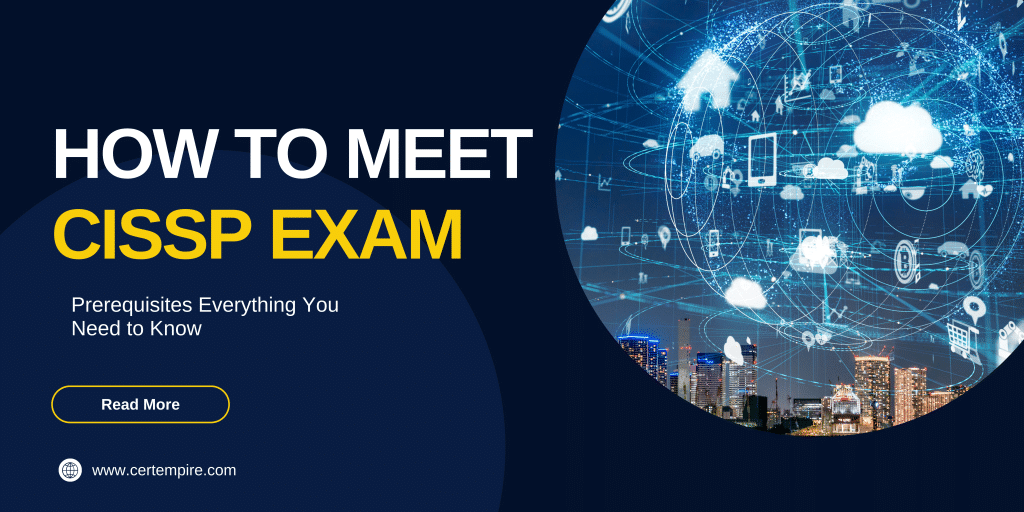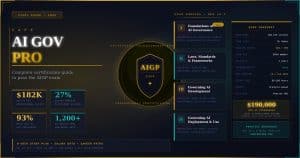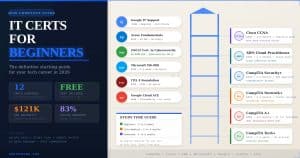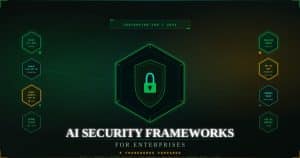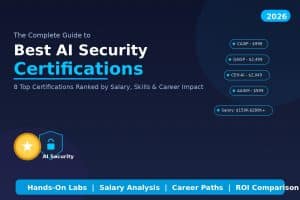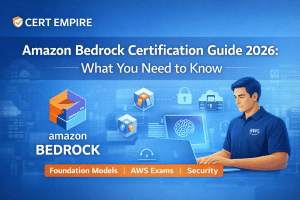If you’re planning to pursue the Certified Information Systems Security Professional (CISSP) certification, you’re taking a significant step toward advancing your career in cybersecurity. However, before you dive into studying for the exam, it’s important to understand the prerequisites required to sit for the CISSP exam. ISC2 has set specific criteria to ensure candidates have the foundational knowledge and experience necessary for this advanced certification.
In this blog, we’ll go over everything you need to know about meeting the CISSP exam prerequisites, including the required work experience, options for candidates who don’t meet the full requirements, and how to kickstart your journey towards becoming a CISSP-certified professional.
TLDR: Too Long; Didn’t Read
To sit for the CISSP exam, you need at least 5 years of work experience in two or more of the eight CISSP domains. If you don’t meet the experience requirement, you can still take the exam and become an Associate of ISC2, which gives you up to 6 years to gain the necessary experience. Understanding the CISSP prerequisites is essential for planning your career path and certification journey.
What Are the CISSP Exam Prerequisites?
The CISSP exam is designed for experienced professionals, which is why it comes with strict prerequisites. To be eligible for the exam, candidates must meet specific work experience requirements. Let’s break down these prerequisites:
1. Work Experience Requirements (5 Years)
ISC2 requires that candidates have at least five years of full-time, paid work experience in two or more of the eight CISSP domains. This work experience must be recent, typically within the last 10 years.
The Eight CISSP Domains:
- Security and Risk Management
- Asset Security
- Security Architecture and Engineering
- Communication and Network Security
- Identity and Access Management (IAM)
- Security Assessment and Testing
- Security Operations
- Software Development Security
How to Fulfill the Work Experience Requirement:
- Job Roles: The most common roles that count towards CISSP work experience include security analyst, security engineer, IT manager, network architect, and systems administrator. If your job involves the design, implementation, or management of security systems and policies, it likely qualifies.
- Relevant Tasks: You need to demonstrate experience with tasks that directly align with the domains. For example, tasks like conducting security audits, risk management or data protection would fulfill the necessary experience in the relevant domains.
CISSP Experience Requirement Table
| Requirement | Details |
| Work Experience | Minimum 5 years of full-time, paid work experience in two or more of the eight CISSP domains. |
| Education Waiver | One year of experience can be waived with a 4-year college degree or an approved credential like CompTIA Security+ or CEH. |
| Part-Time Work | Can be applied if it equals the equivalent of full-time experience (e.g., 2 years part-time = 1 year full-time). |
| Internships | Paid or unpaid internships may count toward the total if properly documented. |
2. What If You Don’t Meet the 5-Year Work Experience Requirement?
If you don’t have the required five years of experience, don’t worry—you can still take the CISSP exam. ISC2 offers a way for you to earn the CISSP certification without the full experience by becoming an Associate of ISC2.
Becoming an Associate of ISC2:
- If you pass the CISSP exam but don’t meet the experience requirements, you can earn the title of Associate of ISC2.
- As an Associate, you’ll have six years to gain the necessary experience in order to convert your Associate status into full CISSP certification.
- While you’re an Associate, you’ll still be able to use the CISSP designation on your resume and gain access to the ISC2 community and resources.
3. Experience Substitution (Up to 1 Year)
ISC2 does allow some substitution for the work experience requirement. Specifically, if you have a four-year degree or a recognized (ISC)² certification, you can substitute up to one year of work experience.
Examples of Valid Substitutions:
- Bachelor’s or Master’s Degree in cybersecurity or a related field.
- Holding another (ISC)² certification such as Certified Cloud Security Professional (CCSP) or Certified Information Systems Auditor (CISA).
This means that if you have the right academic credentials or other certifications, you could fulfill up to one year of the work experience requirement, reducing the total time needed to five years.
4. Exam Eligibility for Candidates with Less Experience
Even if you don’t meet the full five years of work experience, you’re still eligible to sit for the CISSP exam under the Associate of ISC2 program. The key steps for candidates with less than five years of experience include:
- Pass the CISSP Exam: After passing the exam, you will receive the title of Associate of ISC2.
- Gain Required Experience: You’ll have up to six years to gain the necessary experience and then submit your experience to ISC2 for full certification.
- Certification Status: Once you meet the experience requirements, your status will be updated to CISSP certified.
5. Recommended Knowledge and Skills Before Attempting the Exam
Even if you meet the work experience requirements, having foundational knowledge in certain areas will significantly enhance your preparation for the CISSP exam.
Recommended Skills:
- Risk Management: Understanding risk management frameworks (e.g., ISO 27001, NIST) will be key to excelling in several domains, especially Security and Risk Management.
- Networking Knowledge: A strong grasp of networking principles (e.g., TCP/IP, firewalls, VPNs) will help in domains like Communication and Network Security.
- Technical Expertise: Familiarity with firewalls, intrusion detection systems (IDS/IPS), and encryption will be helpful for domains such as Security Architecture and Engineering and Communication and Network Security.
- Software Development Security: Knowing the basics of secure coding practices and how to integrate security into the SDLC (Software Development Life Cycle) will be necessary for the Software Development Security domain.
Preparation Tips:
- If you’re new to cybersecurity, consider starting with a foundational certification like CompTIA Security+ or Certified Ethical Hacker (CEH) before pursuing CISSP.
- Study for the CISSP exam using official study guides and practice exams to get a feel for the question formats and topics.
Associate of ISC2 Path Table
| Step | Action | Timeline |
| Pass CISSP Exam | Pass the official CISSP exam even if you don’t have full experience. | Immediately after passing |
| Apply for Associate Status | Submit an application to become an Associate of ISC2. | Within exam registration period |
| Gain Required Experience | Accumulate the remaining years of professional cybersecurity work. | Up to 6 years allowed |
| Upgrade to Full CISSP | Once 5 years of qualifying work experience are documented, upgrade to full CISSP certification. | After meeting experience |
Quick Summary
To sit for the CISSP exam, you must have at least 5 years of work experience in two or more of the CISSP domains. If you don’t meet this requirement, you can still pass the exam and become an Associate of ISC2, giving you up to 6 years to gain the necessary experience. Candidates with a relevant degree or other certifications may substitute up to one year of experience. Preparation in areas like risk management, networking, and software security is essential.
Final Thoughts
Meeting the CISSP exam prerequisites is the first step on your journey to earning one of the most respected certifications in the cybersecurity industry. Whether you need to gain additional work experience or start as an Associate, it’s essential to understand the requirements and plan your path accordingly.
The CISSP certification is a major milestone in your career, and the effort you put into meeting the prerequisites will be worth it. Whether you’re already eligible or need to take some extra steps, you’re on the right track to becoming a leader in cybersecurity.
More Resources
For a deeper dive into the CISSP exam prerequisites, including how to meet eligibility requirements, visit the official CISSP certification guide.
If you’re looking for more resources on preparing for the CISSP exam, check out these related blogs:

